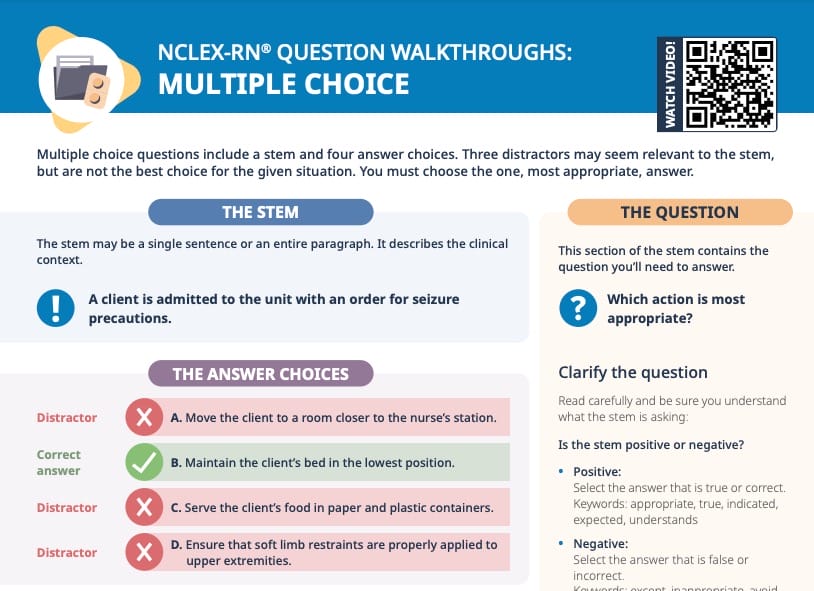Dissect the aspects in the question stem
Who is in the question, in which role?
The question mentions a nurse (you) and one client that the nurse cares for.
What is going on with the patient/client?
The only information about the client is that they are at risk of hypertension – they don’t have it yet, but are at an increased risk.
What is the nurse’s role in this situation?
Since the client does not currently have hypertension yet, the nurse’s main role is prevention and patient education.
Recall the main points about hypertension
- Hypertension is defined as blood pressure >= 140/90 mm Hg.
- It is very common.
- Hypertension can lead to serious issues like arrhythmias, shortened life expectancy, heart attacks, heart failure, kidney failure, dementia, stroke, etc.
- Risk factors:
- Non-modifiable: age, race, family history
- Modifiable: obesity/being overweight, lack of physical activity, smoking, high-salt diet, alcohol consumption, stress
- Treatment starts with lifestyle changes (weight loss, sodium control, exercise) and can be escalated to medications that decrease vascular resistance.
Related videos
Compare the answer choices and eliminate the ones you are immediately sure are false
Multiple-choice questions on the NCLEX are best answered in a 2-step process:
- In a first pass, don’t try to identify the correct answer yet. Only eliminate the answer choices you immediately can see are wrong, because they contain false facts, contradictions, or are generally never recommended options.
- In your second pass through the choices, then look at the ones you did not eliminate in more detail and compare them to find the most correct answer for the situation in the question stem.
A. Reviewing antihypertensive medications and ensuring the client takes them
Reviewing medications and ensuring adherence to the plan is generally a nurse’s responsibility, so this answer choice does not need to be eliminated immediately. Keep for now.
B. Providing effective health coaching on ways to prevent HTN
Health coaching is definitely an important responsibility of the nurse when it comes to prevention. Keep for now.
C. Showing the client statistics about the mortality rate of HTN
This statement can immediately be identified as non-therapeutic. Scare tactics should never be used with patients, even if with the goal of preventing more harm to them. It is not helpful to the client. This answer should be eliminated.
D. Telling the client they must stop smoking and drinking
From the tone of this statement, it is apparent that this is also not a therapeutic statement.
Therapeutic communication does not involve telling clients what to do. Effective communication encourages and educates clients to make the best decisions, such as strategies using motivational interviewing. Being authoritative and judgmental like the answer choice sounds, will likely make the client push back and won’t help them ultimately.
This answer should therefore also be eliminated in the first pass through the answer choices.
Compare the remaining answer choices in detail
C and D were eliminated due to being non-therapeutic communication, so it comes down to answer A and B:
- Reviewing antihypertensive medications and ensuring the client takes them
- Providing effective health coaching on ways to prevent HTN
Remember, the stem does not state the client has hypertension, it says the client is at risk for hypertension. There is a risk of the client developing hypertension. So, knowing that even for people who already have hypertension, the first treatment step is diet and exercise, not medication, it is likely this client may not even be on any medication yet. As detailed above, there are a lot of modifiable risk factors for hypertension that can and should be addressed before turning to medication. In this scenario, the answer that focuses on health coaching and educating the client to try and prevent or delay hypertension would be the most fitting: Answer B is the best choice and the correct answer.
Concepts to recall from this practice question
- All client education should be done with therapeutic communication styles. Regardless of your intention, non-therapeutic communication styles are never the correct answer.
- Clearly differentiate between a client who has a diagnosis and a client who is at risk of developing something (does not have the diagnosis yet).
- Approach multiple-choice questions in a 2-step process: first eliminate distractors, then systematically compare feasible answers in relation to the question stem.
